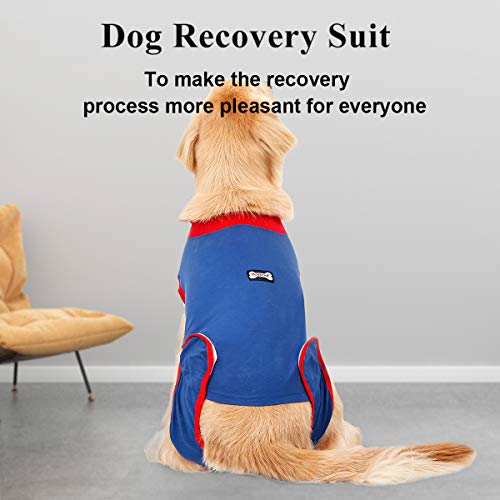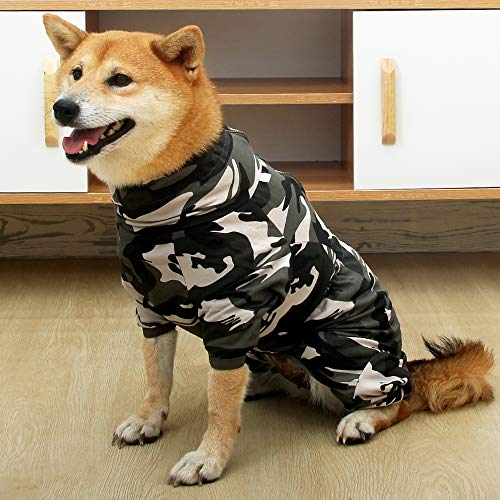Your dog may respond to this itchiness by licking or chewing. Let’s talk about how to keep your dog from licking their stitches after surgery.

Recovery Suit for Dogs Cats After Surgery, Recovery Shirt
Symptoms of infections after surgery.

Dog licking wound after surgery. The incision may become itchy as the wound heals and the fur begins to grow back in. A seroma can form at an incision site after surgery. All symptoms will be temporary, so don’t worry if your best friend is snappy.
Licking can cause infection, and if your pup licked its wound aggressively, it may have reopened. Whether your dog has been spayed or neutered or had a cut sewed up, there are some basics to know about wound care in dogs. After a surgery, the wounds are typically bandaged and the dog will experience swelling and pain.
Take them outside every few hours the day of and the day after the surgery. Nevertheless, you have to prevent him from. My dog has a large open wound and my veterinarian recommended leaving it open to heal rather than repairing it with sutures.
Some discharge is normal after surgery, but anything more than a few drops is cause for concern. But wild animals are busy staying safe and finding food whereas a well fed, pampered pet can devote a lot of time to licking a wound, making it more extensive and sore in the process. If needed, have one for your dog._x000d_ _x000d_ features:_x000d_ crafted from cotton and polyester, soft, stretchy and comfortable for.
For wild or feral dogs licking is probably beneficial in cleaning a wound. Surgery sites are especially dangerous for dogs to lick. Well, the best replacement for the “cone of shame” is a dog onesie to stop licking.
It _x000d_ features soft fabric, ribbed neck, hook & loop tape, easy to put on and take off. Although clothing will not prevent stitches from getting wet and will not deter a dog determined to get to the wound, they provide an effective barrier that will. No dog will be happy to nurse an injury.
If the incision has reopened call the vet immediately. This can be used in conjunction with a bandage if the wound is still open, but typically surgical recovery suits are used, as the name implies after a surgery has been performed on your pup. The dog licking and chewing the wounds after the infection, as the tongue has multiple bacteria ;
Recovery suit to protect your dog's wound after surgery. If your dog licks its spay incision, you need to monitor the wound intently. Licking or chewing on an incision can pull out stitches or introduce an infection.
It hurts and makes dogs uncomfortable and unhappy. The telltale sign of a spay incision infection is excessive wound weeping. So, the best step they usually take is to lick the wounds.
My 6 year old doberman had a growth removed from his left fron leg right at the elbow area. Especially if this discharge starts to smell foul, immediate action should be taken. Licking can break down sutures and reopen the site, necessitating a trip.
So limiting access to wounds, particularly surgical ones with stitches, is important. But remember, discourage licking after surgery, especially if there are stitches involved (dogs are likely to bite and pull them out). In the first few days after surgery, your dog may instinctively try to clean the operation site by licking.
When your pup is injured or after he’s gone through surgery, there are high chances that he will lick his wound in an attempt to reduce pain or irritation as well as clear any discharge from the wound or incision. Licking and chewing can also slow healing by reopening wounds. It is a misconception that a dog’s saliva is somehow antibacterial or will promote healing of a wound, and it only takes a few minutes of licking or chewing for a dog to pull out their stitches and reopen their wound, or to introduce infection.
What should i do if my dog is licking his wound or chewing the stitches? Another way to keep your dog from licking their wound without using a collar is simply restricting access to the wound by covering it up with a surgical recovery bodysuit. Look out for a dog pulling out hair, itching, or licking stitches when recovering from surgery.
How long after surgery can i bathe my dog? Assess the damage and act accordingly. So, if your dog just had surgery, this could be the reason the dog is licking his wound.
As your dog’s surgery wound heals, it may become itchy, which prompts your dog to want to lick or chew it. This can become very serious, needing immediate attention by a veterinarian, who may have to. Licking of wounds also helps with blocking the pain receptors.
A case of too much licking causing skin damage. To prevent licking, most veterinarians recommend your pet. Dogs and cats tend to instinctively lick their wounds, which can often do more harm than good, so keeping your pet from licking their wound is an important part of surgery aftercare.
A seroma is a swelling resulting from the accumulation of fluid under the skin. However, these should subside within three to five days. A good amount of licking can be helpful for small wounds.
Aloe vera on dog stitches might help, or your vet could recommend an. Since your dog (and you) aren’t comfortable with a cone, you’re forced to find an alternative. What happens if my dog licks his surgery after neuter?
With access to the wound, your pet’s licking could delay healing, lead to infection, or even remove the stitches and reopen the wound. My 6 year.leaving a wound of about 1.stitches.licking. A puffy and swollen wound can also indicate infection.
Here’s some advice from vca hospitals, “under no circumstances should a dog with a fresh surgical incision be allowed to run off. Exposure to different bacteria in the environment; Every veterinarian has seen wounds severely traumatized and infected from a.
